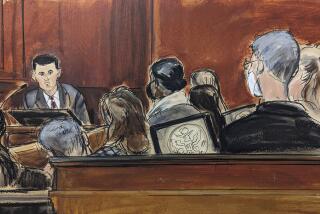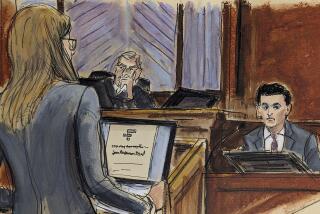Ex-Official Says Keating Knew Risks : Trial: Ex-president of Lincoln alleges that the executive inquired whether the S&L; could ‘cheat’ on bonds and acted out a symbolic roll of dice.
- Share via
LOS ANGELES — A former Lincoln Savings & Loan president on Tuesday described Charles H. Keating Jr. as a man who refused to acknowledge the mounting evidence that his S&L; and its parent company were in serious trouble, instead pushing the sale of corporate bonds with optimistic fervor.
Raymond C. Fidel provided a series of vignettes--descriptions of meetings and telephone conversations with Keating--that amounts to the most damaging testimony so far in the two-month-long criminal securities fraud trial of Keating in Los Angeles County Superior Court.
In one conversation, for instance, Keating asked Fidel if the S&L; could “cheat” on a matter involving the sale of bonds issued by the Irvine thrift’s parent company, American Continental Corp. And in an apparent reference to the company’s risky foreign currency trading, Keating blew into his hands as if he were about to roll dice and told Fidel: “Boy, if only everybody knew.”
Fidel, who already has pleaded guilty to six counts of securities fraud in a plea-bargain, told the jury that he eventually closed down the controversial bond sales program on his own on Feb. 14, 1989, when he no longer could get answers from Keating and other corporate executives to growing questions from bond sellers and prospective customers.
Two months later, American Continental filed for bankruptcy protection, and regulators seized Lincoln. Thousands of small investors lost more than $250 million in the company’s collapse, and taxpayers must foot a $2.6-billion cleanup bill for the S&L;’s failure, making it the costliest thrift failure to date.
Keating, American Continental’s former chairman, is accused in 20 counts of defrauding 22 small investors who bought the company’s risky bonds mostly at Lincoln’s Southern California branches.
The prosecution’s case is focused primarily on charges that Keating failed to disclose details of his bitter feud with regulators and their views that Lincoln was financially troubled.
The outspoken 67-year-old former executive has contended that he has done nothing wrong and that thrift regulators didn’t understand his land development business and carried out a vendetta to destroy him.
His attorney, Stephen C. Neal, has told jurors that Keating used the best lawyers and accountants to structure the bond sales program.
From the start of the bond program in late 1986, Fidel or Robin S. Symes, Lincoln’s chairman, kept Keating informed daily on sales. The program was a high priority, Fidel said, and became a “very high priority” a year later when the company needed to raise about $55 million quickly to buy back more senior bonds at a discount.
In August, 1988, Fidel said he was promoted to president of Lincoln and given a $100,000 raise, making his salary $325,000. He was 29 years old at the time. Within a month, though, he began to realize that the company’s position was precarious.
In December, 1988, Fidel said James Grogan, a corporate staff lawyer who was working on a pending sale of Lincoln, called him and told him to send a letter to regulators and branch managers stating that the thrift would halt its cross-selling of bonds, thus stopping tellers and other Lincoln employees from discussing the bonds with customers.
That left it to American Continental employees in nearby offices to sell bonds on their own.
Bond sales dropped, and Keating became concerned, Fidel said. In a telephone conversation, Keating looked for a way around the new prohibition. “ ‘Couldn’t we cheat’ were his exact words,” Fidel said, but the company stuck with the prohibition.
Fidel’s testimony, in part, is aimed at rebutting testimony by Symes, the former S&L; chairman. Symes said Keating “hit the ceiling” when he learned that Fidel had instituted an incentive plan and threatened to suspend both S&L; executives. Instead, both men were promoted four months later and received substantial raises.
Under cross-examination, Fidel said he gathered information about the company himself and, with one exception, provided it to bond sellers to use in their sales approach. While he was never told to give them negative information about the company, he acknowledged that he could have provided the information.
More to Read
Inside the business of entertainment
The Wide Shot brings you news, analysis and insights on everything from streaming wars to production — and what it all means for the future.
You may occasionally receive promotional content from the Los Angeles Times.










